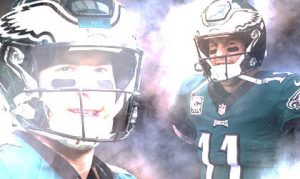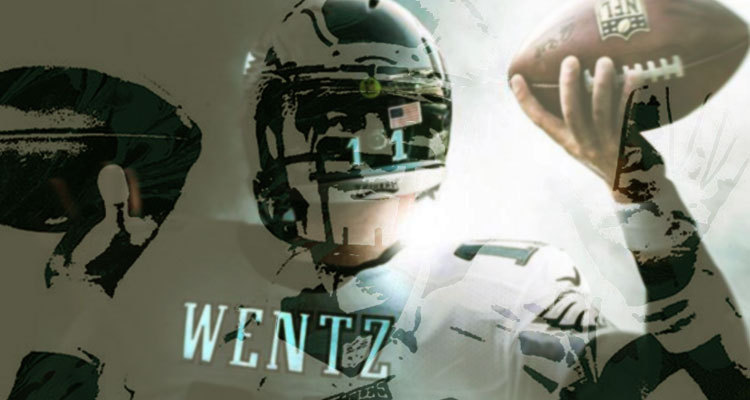On Sunday, January 5th, 2020 the Philadelphia Eagles hosted the Seattle Seahawks in a wild card round NFL playoff game at Lincoln Financial Field in Philadelphia, Pennsylvania. The Seahawks ended up defeating the Eagles 17 to 9 in this contest.
Seattle will now go on the road to play the Green Bay Packers this Sunday, January 12th, 2020 at 5:40 pm CST from Lambeau Field in Green Bay, Wisconsin. The Philadelphia Eagles 2019 – 2020 NFL season is officially over as a result of their loss to the Seahawks.
During the first quarter of the wild card playoff match up between Philadelphia and Seattle, the Eagles starting quarterback Carson Wentz came in contact with an intense helmet to helmet collision from behind with the Seahawks defensive end Jadeveon Clowney. After absorbing this nasty hit Wentz stayed in the game and threw a couple of passes downfield before realizing he had suffered a serious concussion.
No Indication:
None of the on the field medical specialists provided by the NFL or the franchises involved in this contest had any idea that Wentz was experiencing concussion symptoms. They are instructed to immediately take a player out of the game immediately if they for any reason believe that an athlete has suffered any kind of head injury even ones like minor concussions which football players often refer to as getting their bell rung.

Wentz removed himself from the game on his own power, and instantly explained to his coaches and the medical staff on their sideline that he thinks he endured a concussion from the helmet to helmet hit laid on him by Jadeveon Clowney. This is extremely rare that a starting quarterback in a very close NFL playoff game would take himself out of the sporting event and report concussion symptoms especially so early on in the game.
Due to Carson Wentz demonstrating such self discipline by looking out for his overall physical well being and long term mental health he has been labeled as heroic by the NFL’s chief medical officer. The NFL’s chief medical officer is Dr. Allen Stills who commends the quarterback from the University of North Dakota for taking himself out of game action and reporting concussion symptoms which everyone knows is so hard for them to want to do.
This was Wentz’s first career NFL postseason game. He suffered a torn ACL toward the end of the Philadelphia Eagles 2017 – 2018 NFL regular season causing him to miss out on the Eagles Super Bowl championship run. Last year he was forced to miss out on Philadelphia’s wild card round playoff loss due to lingering back injuries. In both cases he had to watch his teammate and the franchise’s former back up quarterback, Nick Foles, take his place as Wentz desperately wished he could help his team win those NFL postseason contest.
Commentary:
I have to give Carson Wentz a whole lot of credit for doing something so hard to do as well as something you know he absolutely did not want to do. I believe he is extremely smart for not trying to play through a game with a concussion no matter how important of a game it is.
The NFL and most people that follow the game of football understand how serious the effects of CTE (chronic traumatic encephalopathy) are which is caused by players getting concussed while already are suffering from a concussion at the moment. Wentz is a hero. He should inspire other professional football players and really anyone playing football no matter what level they are on to follow his example and take action on their own in response to enduring any concussion symptoms.
Wentz’s Regular Season Passing Statistics:
| Year | Age | Tm | Pos | No. | G | GS | QBrec | Cmp | Att | Cmp% | Yds | TD | TD% | Int | Int% | 1D | Lng | Y/A | AY/A | Y/C | Y/G | Rate | QBR | Sk | Yds | NY/A | ANY/A | Sk% | 4QC | GWD | AV |
| 2016 | 24 | PHI | QB | 11 | 16 | 16 | 7-9-0 | 379 | 607 | 62.4 | 3782 | 16 | 2.6 | 14 | 2.3 | 192 | 73 | 6.2 | 5.7 | 10.0 | 236.4 | 79.3 | 49.4 | 33 | 213 | 5.58 | 5.09 | 5.2 | 1 | 1 | 10 |
| 2017* | 25 | PHI | QB | 11 | 13 | 13 | 11-2-0 | 265 | 440 | 60.2 | 3296 | 33 | 7.5 | 7 | 1.6 | 161 | 72 | 7.5 | 8.3 | 12.4 | 253.5 | 101.9 | 77.2 | 28 | 162 | 6.70 | 7.43 | 6.0 | 1 | 1 | 14 |
| 2018 | 26 | PHI | QB | 11 | 11 | 11 | 5-6-0 | 279 | 401 | 69.6 | 3074 | 21 | 5.2 | 7 | 1.7 | 159 | 58 | 7.7 | 7.9 | 11.0 | 279.5 | 102.2 | 62.6 | 31 | 202 | 6.65 | 6.89 | 7.2 | 2 | 2 | 9 |
| 2019 | 27 | PHI | QB | 11 | 16 | 16 | 9-7-0 | 388 | 607 | 63.9 | 4039 | 27 | 4.4 | 7 | 1.2 | 213 | 53 | 6.7 | 7.0 | 10.4 | 252.4 | 93.1 | 62.9 | 37 | 230 | 5.91 | 6.26 | 5.7 | 2 | 4 | 12 |
| Career | 56 | 56 | 32-24-0 | 1311 | 2055 | 63.8 | 14191 | 97 | 4.7 | 35 | 1.7 | 725 | 73 | 6.9 | 7.1 | 10.8 | 253.4 | 92.7 | 129 | 807 | 6.13 | 6.30 | 5.9 | 6 | 8 | 45 | |||||
Playoff Passing Statistics:
| Year | Age | Tm | Pos | G | GS | QBrec | Cmp | Att | Cmp% | Yds | TD | TD% | Int | Int% | 1D | Lng | Y/A | AY/A | Y/C | Y/G | Rate | Sk | Yds | NY/A | ANY/A | Sk% | 4QC | GWD |
| 2019 | 27 | PHI | QB | 1 | 1 | 0-1 | 1 | 4 | 25.0 | 3 | 0 | 0.0 | 0 | 0.0 | 0 | 3 | 0.8 | 0.8 | 3.0 | 3.0 | 39.6 | 1 | 1 | 0.40 | 0.40 | 20.0 | ||
| Career | 1 | 1 | 0-1 | 1 | 4 | 25.0 | 3 | 0 | 0.0 | 0 | 0.0 | 0 | 3 | 0.8 | 0.8 | 3.0 | 3.0 | 39.6 | 1 | 1 | 0.40 | 0.40 | 20.0 | |||||
Media Statements:
“I think what Carson Wentz did is heroic and should be highlighted as an example of how an unbelievably skilled and competitive athlete understands the seriousness of concussion injury and is willing to honestly report it and receive the care that he needs independent of his desire and drive to continue to participate in the game,” Dr. Allen Sills stated. “Having a concussion and playing through it is not about toughness. That’s demonstrating a lack of understanding of the severity of the injury. So I applaud Carson Wentz for understanding how serious this injury is and for getting appropriate care that he needs.”
“It’s a great example to players at all ages and levels that you only have one brain and you shouldn’t take chances with a brain injury,” explained Sills who happened to be a neurosurgeon at Vanderbilt University Medical Center. “Brain injuries are different than other injuries. Anytime someone has a sprained ankle, you can see their ankle swell up or they dislocate a finger and you can see the finger pointing in the wrong direction. You can’t see a brain injury from the outside, but that does not make it any less severe or any less dangerous to the recipient than any of those other injuries.”
“I would vigorously disagree,” says Sills. “Video identification of [symptoms] is one part of a concussion identification. You’re not going to see things like amnesia or confusion on video, and that’s why all the other elements of detection are really important.”
“You have to have people talking to the players,” Sills exclaimed. “You want to make the players and their officials and coaches and everyone aware of the symptoms because you’re not always going to see it on video, but yet there will be signs there if you’re looking at everything.”
“I just applaud him for setting the example that we want all players to follow,” Sills stated. “The Eagles’ medical staff acted immediately and appropriately as soon as they were aware of the diagnosis. They didn’t treat this player any differently than they would have a backup or if this was a preseason game. Our concussion protocol and our care is the same in every single game, no matter who the player is or what the situation or what the implications are.”



